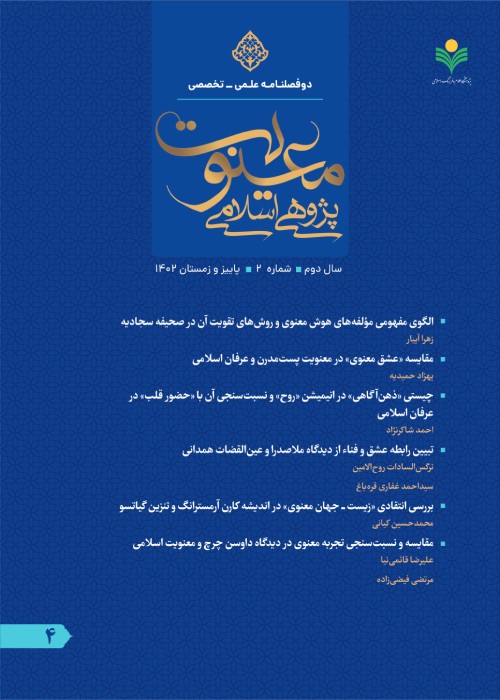An Explanation of the Relationship between Love and Death from the Perspective of Mulla Sadra and Ain al-Quzat Hamedani
It is very important to explain the mystical and philosophical ontology of love and death by God, which shows the ultimate perfection and the end of the ascension of the lover. The purpose of this research is to explain the relationship between love and mortality in the works of Mulla Sadra and Ain al- Quzat Hamedani, and seeks to find out whether the relationship between love and the beloved remains in death, or whether love and death are mutually exclusive. This research, with the comparative analytical method and the use of library data, deals with the comparative comparison and analysis of the thoughts of Mulla Sadra and Ain al-Quzat Hamedani as two representatives of philosophy and mysticism. The death of a lover means becoming righteous and losing egotism. Death is the problem of love, and in the position of death, which is the ultimate love and a higher position than it, there is no duality of lover and beloved. Although the examination and analysis of common thoughts and themes shows the alignment of the views of these two scholars regarding the explanation of the relationship between love and death, but by comparing their views carefully, it is possible to comment on the superiority of Mulla Sadra's explanation. While accepting the correct mystical explanations, he provides a more detailed and deeper analysis of the relationship between love and death by benefiting from his ruling bases, such as the physicality of occurrence and the spirituality of the survival of the soul, the substance theory, the unity of the wise and the reasonable.He considered the death of the lover as the meaning of existential annihilation and the essential change of the natural determination to the right determination.
-
Comparison of the Views of Philosophers and the Holy Quran in the Discussion of Time, Aeon and Everlasting (Sempiternity)
Abdullah Mirahmadi *, Narges Al-Sadat Rouholamin
Journal of Islamic Philosophical Doctrines,



